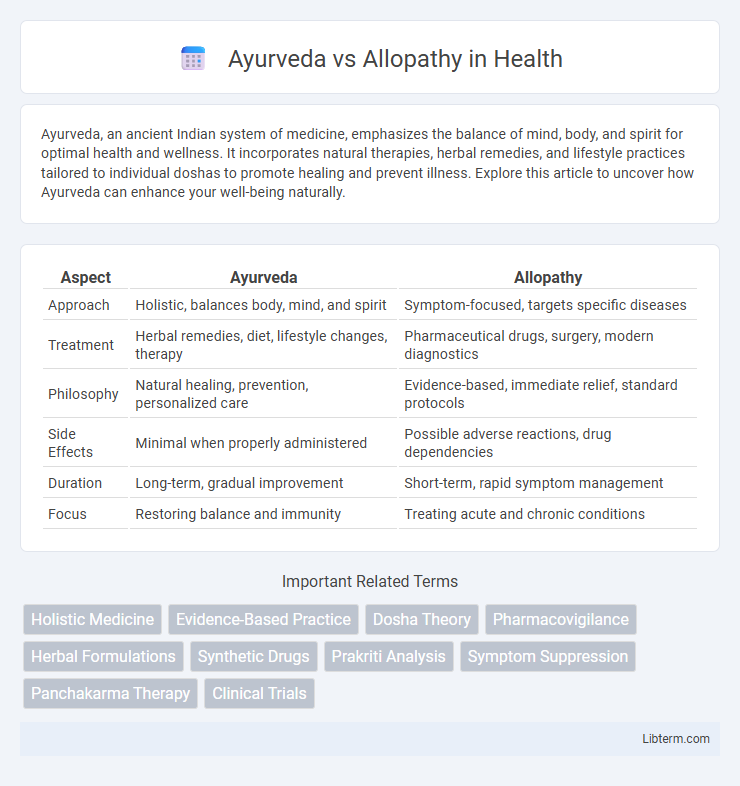Ayurveda, an ancient Indian system of medicine, emphasizes the balance of mind, body, and spirit for optimal health and wellness. It incorporates natural therapies, herbal remedies, and lifestyle practices tailored to individual doshas to promote healing and prevent illness. Explore this article to uncover how Ayurveda can enhance your well-being naturally.
Table of Comparison
| Aspect | Ayurveda | Allopathy |
|---|---|---|
| Approach | Holistic, balances body, mind, and spirit | Symptom-focused, targets specific diseases |
| Treatment | Herbal remedies, diet, lifestyle changes, therapy | Pharmaceutical drugs, surgery, modern diagnostics |
| Philosophy | Natural healing, prevention, personalized care | Evidence-based, immediate relief, standard protocols |
| Side Effects | Minimal when properly administered | Possible adverse reactions, drug dependencies |
| Duration | Long-term, gradual improvement | Short-term, rapid symptom management |
| Focus | Restoring balance and immunity | Treating acute and chronic conditions |
Introduction to Ayurveda and Allopathy
Ayurveda, an ancient Indian medical system, emphasizes holistic health through natural remedies, herbal treatments, and balance of body, mind, and spirit. Allopathy, modern Western medicine, relies on evidence-based practices, pharmaceuticals, and surgical interventions to treat specific diseases and symptoms. Both systems aim to improve health but differ fundamentally in approach, diagnostics, and treatment methodologies.
Historical Origins and Philosophies
Ayurveda, originating over 5,000 years ago in ancient India, is grounded in holistic principles emphasizing balance among the body's three doshas: Vata, Pitta, and Kapha. Allopathy, developed in the 19th century by Samuel Hahnemann and others, is based on the biomedical model focusing on diagnosing and treating diseases with drugs and surgery. While Ayurveda integrates mind, body, and spirit through natural remedies and lifestyle, Allopathy relies on scientific research, evidence-based protocols, and technological interventions.
Diagnostic Approaches
Ayurveda employs a holistic diagnostic approach based on the assessment of the doshas (Vata, Pitta, Kapha), pulse diagnosis (Nadi Pariksha), and detailed patient history including lifestyle and mental state. Allopathy relies heavily on objective diagnostic tools such as blood tests, imaging techniques (X-rays, MRI, CT scans), and standardized clinical examinations to identify specific diseases. While Ayurveda emphasizes restoring balance in bodily energies, allopathy focuses on identifying and treating distinct pathological conditions through evidence-based methods.
Treatment Methods and Modalities
Ayurveda employs holistic treatment methods such as herbal remedies, Panchakarma detoxification, and personalized dietary plans to balance the body's doshas--Vata, Pitta, and Kapha--for natural healing. Allopathy primarily uses pharmaceutical drugs, surgery, and standardized medical protocols to target specific symptoms and diseases based on evidence-based practices. While Ayurveda emphasizes prevention and lifestyle modification, allopathy focuses on acute intervention and symptom management through advanced diagnostics and therapeutic technologies.
Use of Natural vs Synthetic Medicines
Ayurveda emphasizes the use of natural medicines derived from herbs, minerals, and animal products, promoting holistic healing with minimal side effects. Allopathy relies primarily on synthetic drugs created through chemical processes, targeting specific symptoms or diseases for rapid relief. The choice between these systems often depends on treatment goals, patient preferences, and conditions requiring either natural remedies or precise pharmaceutical interventions.
Approach to Chronic Diseases
Ayurveda addresses chronic diseases by emphasizing holistic healing through balancing the body's three doshas--Vata, Pitta, and Kapha--using herbal remedies, dietary adjustments, and lifestyle changes tailored to individual constitution. Allopathy focuses on managing symptoms and disease progression with pharmaceutical drugs, surgeries, and standardized protocols based on evidence-based medicine. Ayurvedic treatment aims for root cause elimination and long-term wellness, whereas allopathy prioritizes rapid symptom relief and acute condition management.
Preventive Healthcare Strategies
Ayurveda emphasizes personalized preventive healthcare through balancing the body's doshas, utilizing herbal formulations, dietary guidelines, and lifestyle practices like yoga and meditation to strengthen immunity and prevent diseases. Allopathy focuses on preventive measures such as vaccination, regular screenings, and evidence-based interventions to detect and reduce risk factors for chronic illnesses. Integrating Ayurvedic holistic approaches with allopathic preventive protocols can enhance overall health resilience and disease prevention outcomes.
Side Effects and Safety Profiles
Ayurveda utilizes natural herbs and holistic treatments, generally offering a lower risk of side effects compared to allopathy, which relies on synthetic drugs with potential adverse reactions including allergies, gastrointestinal issues, and long-term organ damage. The safety profile of Ayurveda depends on proper diagnosis and quality control of herbal preparations, as improper use can lead to toxicity or interactions with allopathic medicines. Allopathy provides rapid symptom relief and acute care but requires careful monitoring to manage drug toxicity and side effects associated with pharmaceuticals.
Integration and Collaboration in Modern Healthcare
Integration of Ayurveda and Allopathy enhances patient care by combining holistic, personalized herbal treatments with evidence-based, technologically advanced medical interventions. Collaborative efforts in modern healthcare promote research on efficacy, safety, and complementary use, fostering innovative protocols that address chronic diseases and preventive health. This multidisciplinary approach supports comprehensive wellness, reducing side effects and improving patient outcomes through tailored, integrative therapeutic strategies.
Choosing the Right Approach for Individual Needs
Ayurveda emphasizes holistic healing by balancing the body's doshas through natural remedies and lifestyle changes, making it ideal for individuals seeking personalized, preventive care. Allopathy offers targeted, evidence-based treatments and rapid symptom relief, suitable for acute conditions and emergencies requiring standardized medical interventions. Choosing the right approach depends on individual health goals, medical conditions, and preference for traditional versus modern treatment modalities.
Ayurveda Infographic

 libterm.com
libterm.com